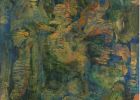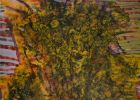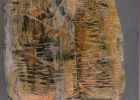Flusser Studies 09 - November 2009
The Art of the Vampyroteuthis - Vilém Flusser, Vampyroteuthis infernalis: His Art
In this excerpt from his hybrid text of philosophical fiction, Vilém Flusser examines the history and future of human art and communication from the perspective of a giant deep-sea squid, the Vampyroteuthis infernalis. Fictionalizing some of the accepted biological details about the extant species of squid, Flusser oscillates between an encyclopedic description of the animal’s anatomical and behavioral characteristics and a cultural history of human art making. He proposes the world of the Vampyroteuthis as a model for human communication in the age of television, film and digital images. With his skill for de-familiarizing everyday aspects of human life, Flusser holds the molluscan creature up to his reader as a mirror in which human behavior can be considered from an opposing, almost inhuman perspective.
Bodenlos - Without Ground
‘Bodenlos - Without Ground’ is a collective creation that explores the scenic possibilities of Vilém Flusser’s life and work, marked by the flight from Prague during the Second World War and the subsequent exile in Brazil. Flusser lived here for several decades, writing books, lecturing at universities (including USP) and writing articles for major newspapers. His work, which has been valued in Europe, still isn’t truly recognized here in Brazil. Thus, the GTP sought to shed light on this thinker’s major contribution to Brazilian philosophy, contributing to the rediscovery of his work. When creating the play ‘Bodenlos - Without Ground’, the group chose performance art and an aesthetic research of the word as a theatrical language to discuss the issue of uprooting, of losing safe ground and the feeling of being a stranger in the world, which was so important in Vilém Flusser’s life. The theme is interesting not only for those who feel the emptiness of being rejected by the world they live in, but also for immigrants and descendants of other people who compose Brazilian society.
Directed by: Bia Szvat Performed by: Grupo de Teatro da Poli (GTP) (SÃO PAULO, BRASILIEN)
With: Amanda Freire, Isadora Giuntini, Luis Fernando Pasquarelli, and Maurício Dwek
Duration: approx. 90 min
Das ’Ende der Politik’ in der Kulturphilosophie Vilém Flussers
In my contribution I try to work out the political implications of Flusserian thought. I show first that the beginning of post-history, which Flusser himself does not date precisely, should be determined from a political point of view - Auschwitz. For Flusser, as well as for the political philosopher Hannah Arendt, Auschwitz presented a breach with the Western tradition. But, opposed to Arendt, Flusser states that the breach of tradition in a sense continues, and the renewal of the political space, considered possible by Arendt, becomes increasingly impossible with the impact of the technical pictures. The forecast of the „death of the politics‟ is explained by Flusser with the fact that a specific political difference, namely that of public and private space, has become fragile because of the communication revolution. To preserve the freedom and dignity of the human being in post-history, the lost balance of dialogue and discourse, according to Flusser, has to be restored and an „installation of the apparatus-totalitarianism‟ has to be prevented. Finally, I close with a short reflection about how Flusser‟s theory of the telematic society can be understood as an answer to the menace of the political in modern society, as it was assumed by Arendt in Vita activa.
Golem, Roboter und andere Gebilde. Zu Vilém Flussers Apparatbegriff
This essay attempts a systematic genealogic reconstruction of Flusser’s concept of apparatus from Portuguese texts of the early 1960ies up to the Bochumer Vorlesungen held in the summer of 1991 shortly before Flusser’s death. As with many other instances from Flusser’s work the concept of apparatus is decidedly interdisciplinary in nature, positioning itself on the border of philosophy, sociology, history, literature, the arts, cybernetics and technology. This fundamental ambivalence becomes particularly visible in the use of the German word ‘Apparat’ and its many derivatives, as for instance ‘Verwaltungsapparat’, ‘Fotoapparat’ or ‘Messapparat’, subsuming under the same heading the photographic camera, Kafka’s impenetrable bureaucratic apparatus and the perfectly operating apparatus of Auschwitz. Over the course of many years Flusser combined different textual sources to fashion his view of the apparatus. Many of them stem directly from the history Prague. Apart from Kafka’s novels, Karel Čapeks R.U.R, as well the figure of the Golem as it appears in the legend of Rabbi Löw, would also have to be mentioned. Flusser’s concept of the apparatus is, furthermore, connected to the philosophy of Hannah Arendt, Martin Heidegger and Giorgio Agamben.
Emergence and Posthuman Narrative
All narrative is a function of architecture, and architecture is always a reflection of its time, especially the architecture of information. The humanist novel, with its concern for individual autonomy, authenticity, and mimetic representation through visual detail, is often designed to depict the world at the human scale: the scale of the every-day world where Newtonian physics work, as well as natural language, and common metaphor. It is the human scale of face-to-face interaction. But at a time when people increasingly understand the world at larger scales, a time when even the concept of the human is being eclipsed by a posthuman awareness, the optical metaphor of the human scale may be less relevant to an architecture of the novel than one that relies upon a larger scale: an architecture which privileges emergence over cause and effect, or pattern over individual viewpoint. By seeing emergence as an organizing principle in the architecture of novels, a mode of narration opens up in both their creation and criticism that complements the contemporary, posthuman ground of being as well as the architecture of the humanist novel once fit the humanist conception of “mankind” and became the “natural” way to write. An earlier version of this essay was delivered as a keynote address to the Centre de Recherches en Littératue Américaine, Universite Paris Sorbonne.
Dear Flusser – Dear Don. Letters from 1973 to 1983
The letter exchange between Vilém Flusser and Donald L. Stacy started in 1973 and ended in 1983. Intrigued by an article Flusser published in the US journal Main Currents of Modern Thoughts, Stacy started a conversation that proved influential for both participants. It lead to a friendship that was first only intellectually and later also emotionally engaging. By being a constant challenge to each other, the „author of words“ and the „painter of images“ enjoy disagreeing on art, knowledge, truth, reality, editing and friendship. Their discussion of the relationship between images and words is deeply intertwined and sometimes concurrent with a discussion of their personalities. Their self perception and perception of each other, together with their reflection on the friendship itself turn the whole conversation into a fascinating set of documents on personal and creative influences.



